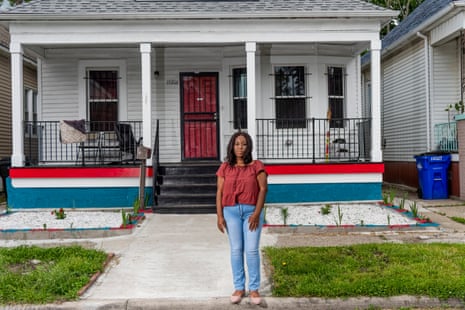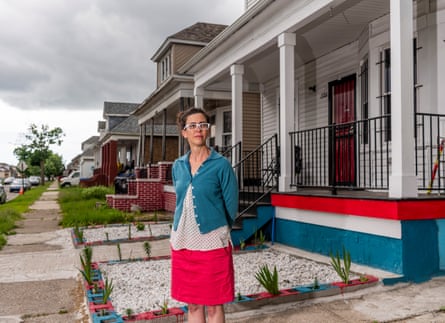Miraculously, Tomeka Langford is willing to talk to me.
The 47-year-old Black woman is a long-standing Detroiter. A career pharm tech with four kids and six grandkids, her family has lived in the city ever since her grandparents came up from the south.
I am white, single and childless. In 2016, I was given a house by Write a House, a short-lived Detroit-based organization founded in 2011 to award homes to low-income scribes. The gift was meant to support writers with some of the city’s plentiful housing stock – and thus change the stories that get told about Detroit.
It was, on paper, a great idea. But the house I was given already belonged to someone: Tomeka Langford.
I didn’t know it at the time. Neither did Tomeka.
I settled into the adorable house, which sits in a cheerful neighborhood dubbed BanglaTown, after the area’s majority-Bangladeshi community. But the organization started to crumble once I moved in, and soon the roof of the house did, too – needing immediate replacement.
After the roof was replaced, I realized I was now living in a surprisingly expensive free house, trying to fulfill the mission of an organization that no longer existed. It was frustrating and unsustainable.
When I was offered a job in another state, I took it, and put the house on the market. This is when I realized I’d never been listed on the house’s title. Legally, the house did not belong to me.
Shortly after that is when Tomeka first came across my name. It was on the documents she received when I sued her for ownership of a house I’d been told was mine, a house that had, confusingly, already been taken from her years beforehand.
This isn’t a story about gentrification – at least, not how we usually think about it. It’s a story of a Black woman losing her home to municipal greed, and a white woman benefitting from her loss. It’s a story about the racial wealth gap, and how the median white American household accrues almost eight times the wealth of most Black American households.
But it’s also a story about what we do next: how we calculate damage, and what we might do to repair it.
Tomeka bought the house in 2010 for only $700, knowing there would be back taxes to pay off. She had always been a renter, and wanted to trade in monthly rent for home equity.People were selling houses in Detroit for dirt cheap then – $5,000, $2,000, $500, $1 – but they needed a ton of work and came with hefty property tax bills.
Tomeka’s husband introduced her to a guy who was offloading a house in BanglaTown. It was a fixer-upper, but Tomeka’s husband is a contractor. Steady employment meant she could cover the cost of the house, purchase supplies for repairs, bring in family to do the labor, and start paying down back taxes.
She says the seller, William C Murray II, was straightforward about both repairs and back taxes. They would amount to at least $10,000.

Documents show that Murray had purchased the house in 2009 for $1,000 from Deutsche Bank National Trust, the German multinational bank and financial services company that had acquired the house when the previous owner, a man with a Bangladeshi name, defaulted on his bank mortgage and abandoned it at the peak of the financial collapse.
This unusual chain of ownership explains how a house in the tightly-knit and longstanding immigrant community ever fell out of Bangladeshi ownership – and eventually into my lap.
In 2015, five years after Tomeka bought it, the house was sold for $5,000 to Write A House. A year later, it was given to me under the condition that I upkeep the property, pay taxes, be a good neighbor, and write. The city even gave me a Spirit of Detroit Award for moving into it.
After she bought it in 2010, however, the house technically remained in Tomeka’s name. But that didn’t stop Wayne county from selling it out from under her without telling her why.
When I moved into it, I was told the house had been abandoned, and that it sat unoccupied for eight years. In 2016, it made sense: a lot of people had abandoned houses during the financial crisis.
Write a House had built a fast reputation on the claim that it wasn’t capitalizing on the city’s foreclosure crisis. I was wary – property tax foreclosures were still happening at alarming rates – but the organization had done due diligence, and I was in love with my neighborhood.
After a two-year period, the house was supposed to go in my name. The deed did – the document that gives me the right to own the property. But this is different from a title, as mortgage companies will describe it, because a deed is a document while a title is a legal framework, a set of conditions that confer uncontestable ownership of a property. The title didn’t change hands.
I discovered this when I put the house on the market, two and a half years after I had moved into it. That was when my title agency informed me that the title to the house was still in Tomeka Langford’s name.
I found 52 Tomeka Langfords on Facebook, and soon gave up any attempt to make direct contact. After all, I was told the legal process from here was straightforward – it even has a name. My title agency suggested a law firm, QuietTitle.com, that specializes in quieting titles. For a set price ($1,200 back in 2018) and in lightning speed (90 to 180 days), clients are guaranteed a squeaky-clean title and uncontestable ownership of a property.
Detroit property ownership is a strange experience. The land was only ceded by Indigenous inhabitants in 1807, over a century after the city had already been founded. Selling a house as a white person in a brown community is even more distressing, as pricing, the language used in the listing and how word of sale spreads are coded to maximize sellers’ profits, not maintain community integrity.

Yet the quiet title process is inherently violent. Lawyers for reputed homeowners take swift legal action against all contenders to a property’s title. Few opportunities exist for distressed homeowners to have legitimate claims heard, and in places where disputes may be common – like Detroit – the process itself may fuel displacement.
I found the quiet title process perplexing and sad, but that was before I met Tomeka. That was before I heard, first-hand, how a process made relatively easy for me was in fact traumatic for her.
We tend to think of foreclosure as a logical consequence of too many skipped bank mortgage payments – indeed, the vast majority are bank-driven.
In the US, one in every 854 properties faces foreclosure, numbers that are rising again after a pandemic downturn. But most foreclosures in Wayne county, where Detroit is, are over unpaid property taxes. Few other municipalities treat their bases so aggressively.
There are a lot of property tax foreclosures. Between 2002 and 2016, 143,958 Detroit houses were foreclosed and listed in the county’s tax foreclosure auction, the vast majority after the economic crisis of 2008. The number totals an astonishing 37% of the city’s 384,840 properties.
That’s over a third of the city sold at auction, often for less than $5,000.
The press ate it up, churning out story after story about white artists moving to the city, installing new windows and paying off back taxes – but such articles overlooked who, exactly, bought those foreclosed homes.
A staggering 90% of all properties purchased at auction between 2005 and 2015 were by “investors buying in bulk”, a 2019 report from the University of Michigan shows. These were often abandoned or turned into rental properties. The report shows that 60% of the properties purchased by bulk buyers underwent evictions two or more times.
And evictions target Black women. According to Princeton’s Eviction Lab, nearly twice as many Black renters as white were evicted in 2020. The same study showed that 7.7% more white women than white men were evicted that year, whereas a full 36.3% more Black women than Black men were evicted.
When Tomeka bought her first house, she hoped she had escaped the precarity of the rental market. It was a starter home, barely big enough for her family of six, the youngest members of which was just starting school. “It was never a forever home, but maybe we could have given it to the kids,” she says.
This is no small thing. The primary means by which Americans pass along generational wealth is through home ownership. A 2020 report from the Brookings Institute finds that 30% of white households received an inheritance in the year before the pandemic, averaging just under $200,000. In comparison, just 10% of Black households did, for an average of $100,000.
The pandemic-fueled housing crisis has only deepened the racial wealth gap. Like foreclosure rates, eviction rates are returning to pre-pandemic numbers as the price of renting has skyrocketed.
Housing insecurity doesn’t merely strip the emotional safety of a place to live from neighbors; it forces entire families to give up their investment in future generations.
One lost house can disable a whole bloodline.
Throughout 2010 and 2011, Tomeka and her family stayed in their rental and made visits to the new house for repairs.
“We had to do all new wiring,” she tells me. “We had to put in an electrical box. Lighting. Hot water tank. Furnace. We had to put a few windows in, and then we had to put in some doors and some storm doors. We sanded the floors.”
The rehab was expensive. “I would probably say $6,000 or $7,000,” Tomeka estimates, adding that it would have been more expensive if they’d had to pay for labor. “We were gonna do that attic, finish it off.” She’s getting excited, and I get a glimpse of her from over a decade back, sharing with me a dream made reality through hard work and substantial investment.
Then she straightens, fades and withdraws into herself a bit. “But we never made it up there,” she…
Read More:I was given a house for free – but it already belonged to someone else | Detroit
2022-10-18 13:12:00
